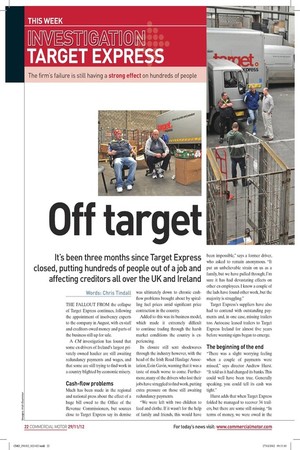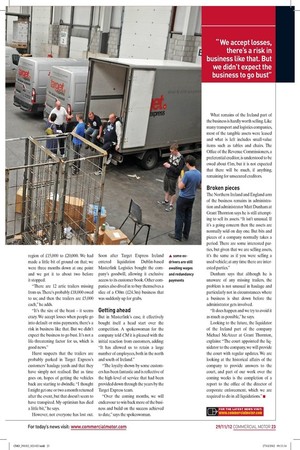Off target
Page 19

Page 20

If you've noticed an error in this article please click here to report it so we can fix it.
It’s been three months since Target Express closed, putting hundreds of people out of a job and affecting creditors all over the UK and Ireland
Words: Chris Tindall
THE FALLOUT FROM the collapse of Target Express continues, following the appointment of insolvency experts to the company in August, with ex-staff and creditors owed money and parts of the business still up for sale.
A CM investigation has found that some ex-drivers of Ireland’s largest privately owned haulier are still awaiting redundancy payments and wages, and that some are still trying to find work in a country blighted by economic misery.
Cash-flow problems
Much has been made in the regional and national press about the effect of a huge bill owed to the Office of the Revenue Commissioners, but sources close to Target Express say its demise was ultimately down to chronic cashflow problems brought about by spiralling fuel prices amid significant price contraction in the country.
Added to this was its business model, which made it extremely difficult to continue trading through the harsh market conditions the country is experiencing.
Its closure still sent shockwaves through the industry however, with the head of the Irish Road Haulage Association, Eoin Gavin, warning that it was a taste of much worse to come. Furthermore, many of the drivers who lost their jobs have struggled to find work, putting extra pressure on those still awaiting redundancy payments.
“We were left with two children to feed and clothe. If it wasn’t for the help of family and friends, this would have been impossible,” says a former driver, who asked to remain anonymous. “It put an unbelievable strain on us as a family, but we have pulled through; I’m sure it has had devastating effects on other ex-employees. I know a couple of the lads have found other work, but the majority is struggling.” Target Express’s suppliers have also had to contend with outstanding payments and, in one case, missing trailers too. Autoease leased trailers to Target Express Ireland for almost five years before warning signs began to emerge.
The beginning of the end
“There was a slight worrying feeling when a couple of payments were missed,” says director Andrew Hurst. “It told us it had changed its banks. This could well have been true. Generally speaking, you could tell its cash was tight.” Hurst adds that when Target Express folded he managed to recover 34 trailers, but there are some still missing. “In terms of money, we were owed in the region of £15,000 to £20,000. We had made a little bit of ground on that; we were three months down at one point and we got it to about two before it stopped.
“There are 12 artic trailers missing from us. There’s probably £18,000 owed to us; and then the trailers are £5,000 each,” he adds.
“It’s the size of the beast – it seems crazy. We accept losses when people go into default or miss payments, there’s a risk in business like that. But we didn’t expect the business to go bust. It’s not a life-threatening factor for us, which is good news.” Hurst suspects that the trailers are probably parked in Target Express’s customers’ haulage yards and that they have simply not realised. But as time goes on, hopes of getting the vehicles back are starting to dwindle. “I thought I might get one or two a month returned after the event, but that doesn’t seem to have transpired. My optimism has died a little bit,” he says.
However, not everyone has lost out. Soon after Target Express Ireland entered liquidation Dublin-based Masterlink Logistics bought the company’s goodwill, allowing it exclusive access to its customer book. Other companies also dived in to buy themselves a slice of a €30m (£24.3m) business that was suddenly up for grabs.
Getting ahead
But in Masterlink’s case, it effectively bought itself a head start over the competition. A spokeswoman for the company told CM it is pleased with the initial reaction from customers, adding: “It has allowed us to retain a large number of employees, both in the north and south of Ireland.” “The loyalty shown by some customers has been fantastic and is reflective of the high-level of service that had been provided down through the years by the Target Express team.
“Over the coming months, we will endeavour to win back more of the business and build on the success achieved to date,” says the spokeswoman. What remains of the Ireland part of the business is hardly worth selling. Like many transport and logistics companies, most of the tangible assets were leased and what is left includes small-value items such as tables and chairs. The Office of the Revenue Commissioners, a preferential creditor, is understood to be owed about €1m, but it is not expected that there will be much, if anything, remaining for unsecured creditors.
Broken pieces
The Northern Ireland and England arm of the business remains in administration and administrator Matt Dunham at Grant Thornton says he is still attempting to sell its assets. “It isn’t unusual. If it’s a going concern then the assets are normally sold on day one. But bits and pieces of a company normally takes a period. There are some interested parties, but given that we are selling assets, it’s the same as if you were selling a used vehicle; at any time there are interested parties.” Dunham says that although he is unaware of any missing trailers, the problem is not unusual in haulage and particularly not in circumstances where a business is shut down before the administrator gets involved.
“It does happen and we try to avoid it as much as possible,” he says.
Looking to the future, the liquidator of the Ireland part of the company Michael McAteer at Grant Thornton, explains: “The court appointed the liquidator to the company, we will provide the court with regular updates. We are looking at the historical affairs of the company to provide answers to the court, and part of our work over the coming weeks is the completion of a report to the office of the director of corporate enforcement, which we are required to do in all liquidations.” n













































